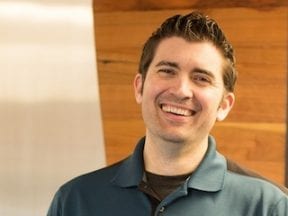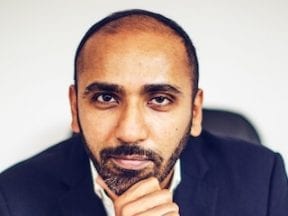Andrew Faris is a former pastor who migrated to digital marketing. From there he rose to CEO of 4×400, an ecommerce aggregator that once owned seven brands. Having recently resigned from that position, he’s now assessing priorities and evaluating his next career move. It’s a not uncommon position for many executives and entrepreneurs.
He told me, “It’s a weird feeling. For the first time in my career, I’ve stepped back and asked myself, ‘What do I want to do? And, what am I worth on the job market?'”
He and I recently discussed his immediate outlook, our business priorities, likes and dislikes, and more.
Our entire audio conversation is embedded below. The transcript is edited for clarity and length.
Eric Bandholz: You’re no longer the CEO of 4×400.
Faris: True. I’m an unemployed marketer. I’m still the host of Ecommerce Playbook, the podcast. I have no firm plans as to what’s next.
It’s been interesting to step back from the CEO role and reflect, “What did I like about that job? What did I not like?” It’s not all roses, as you know.
Bandholz: How many brands were you managing at 4×400?
Faris: It ranged from three to seven. We have three brands now, and we’re going down to one, Bambu Earth, our skincare company. That’s part of why I’m leaving 4×400. Bambu Earth is a great brand. But it’s not what I want to work on in terms of my interests and passions.
We’re selling the other two brands: Slick Products and Modern Fuel.
Bandholz: We have listeners to this podcast interested in buying companies. Give them the sales pitch.
Faris: Slick Products makes cleaning goods for off-road vehicles — ATVs, UTVs, dirt bikes. The company was founded by a family in Hawaii that grew up riding dirt bikes on red clay. When we acquired it in 2018, it had done $100,000 in annual revenue. It finished 2021 at $5.5 million at about 30% ad spend. Roughly $3.5 million is direct-to-consumer; about $1.3 million is on Amazon; around $500,000 is wholesale.
The other is Modern Fuel, which sells beautiful, well-engineered writing instruments. It was created by an aerospace engineer who wanted the best-designed, best-engineered pens and pencils.
Modern Fuel had about $200,000 in annual sales when we acquired it in late 2020. It will finish 2021 at about $1.7 million with roughly a 33% ad spend. It’s almost entirely direct-to-consumer. Modern Fuel is a good, growing brand and doing all of the right things in that stage of business.
4×400’s hypothesis has been to acquire brands with sub-$300,000 in annual revenue and then grow them quickly. If listeners are interested in acquiring Slick Products or Modern Fuel, email us.
Bandholz: I’ve had Brian Goulet of Goulet Pens on this podcast. Did he turn you down?
Faris: He’s all fountain pens. He told me, “As soon as you have a fountain pen, send it to me.”
Bandholz: So you’re now exploring career opportunities.
Faris: Yes, I am. It’s a weird feeling. For the first time in my career, I’ve stepped back and asked myself, “What do I want to do? And, what am I worth on the job market?”
It’s a unique moment with brands, aggregators, and agencies — all are hiring people. I need to sort through what there is to like and not like about each of those.
I certainly enjoy brands. I love ecommerce marketing, the combination of conceptual and analytical. I’m interested in the people I work with and the culture. I’m not interested in working 70 hours a week. I have other interests in life, a family.
Bandholz: Switching gears, in 2021 Beardbrand decided to invest in Facebook ads as a growth strategy. I’m not a fan of Mark Zuckerberg, but if I can leverage his platform to help Beardbrand grow, I’ll do that. However, the result was re-allocating our scarce resources to Facebook with nothing in return. We ended up blowing about $500,000 in ads. And I’m definitely not going back on Amazon. What are your thoughts?
Faris: I agree with what you’re saying. To me, resource constraints are part of the fun. It’s what gets me excited. No discounting the product, no Amazon, and no pop-up. Now I have to solve a problem within those constraints.
Bandholz: We have a no pop-up rule, meaning no uninitiated pop-ups where visitors do not expect it. On our previous site, we had a little mail icon with an orange dot on it. People had to click on the dot to remove it, which would activate our pop-up.
That creates a better experience because the pop-up is less intrusive. So there are ways to solve challenges creatively. Plus, I’m very philosophical. What good are principles if you’re not willing to stand by them?
The big reason I don’t do business with Amazon is how they communicated with us. I don’t take pressure, and I don’t give pressure. I would reconsider selling on that platform so long as it’s not a parent-child kind of relationship. I don’t need to take over the world. I don’t need to buy Lamborghinis and yachts. I need freedom. That’s what I need.
Faris: I’ve admired those qualities in you from a distance. There’s a clarity about your principles that I appreciate. You have a sense of what you’re trying to accomplish. It’s much different from a venture-capital-backed aggregator who wants the moon. You’re trying to build a bootstrapped business with a healthy bottom line. The notion of saying no to Amazon, even if it could generate more profit for Beardbrand, is beautiful.
So founders whose sole goal is to make a huge amount of money, good luck. But I’m probably not your guy.
Bandholz: That’s the beauty of any business. There’s no one way to do it. No right or wrong. I’m not an analytical, data-driven marketer. If I were, I would probably be on Amazon. But I’m good at telling a story, building a brand, and seeing the visual aspect of products. So I lean on that.
I want our listeners to remember that they’re always going to hear stories of winners who have crushed it based on, perhaps, on natural talent or timing. Sometimes the stars align. Moiz Ali grew Native Deodorant to $100 million in sales in two years via Facebook ads. That worked for Moiz. Others could go bankrupt doing that.
Faris: I agree 100%. Especially when you’re early in your career, it’s tempting to follow others. But it’s so important to reflect on what you’re trying to accomplish. That will drive many decisions. Deeply understanding who you are as a founder and what you value will massively affect how you build a company, from relationships to capital requirements.
Bandholz: How can people contact you?
Faris: The best place is Twitter — @andrewjfaris.




